- Home
- Ken Follett
The Evening and the Morning Page 38
The Evening and the Morning Read online
Page 38
“She can’t be sold.”
Stiggy said: “Yes, she can!”
“No, she can’t. She’s a runaway. She must be returned to her legitimate owner.”
Blod whispered: “No, please.”
“It’s not my decision,” Wynstan said cheerfully. “Even if the slave had not spoken disrespectfully to me, the outcome would be the same.”
Ragna wanted to argue, but she knew Wynstan was right. She had not thought of it, but a runaway still legally belonged to the original owner, even after months of freedom.
Wynstan said to Stiggy: “You must take this girl back to Dreng’s Ferry.”
Blod began to cry.
Stiggy had not understood. “But she’s my captive.”
“Dreng will give you the usual reward for returning a runaway, so you won’t be out of pocket.”
Stiggy still looked puzzled.
Ragna believed in obeying the law. It could be cruel, but it was always better than lawlessness. However, on this occasion she would have defied it if she could. It was a harsh irony that the man now upholding the law was Wynstan.
Ragna said desperately: “I will take charge of the girl, and recompense Dreng.”
“No, no,” said Wynstan. “You can’t do that, not to my cousin. If Dreng wants to sell the slave to you, he may, but she must be returned to him first.”
“I shall take her home, and send a message to Dreng.”
Wynstan said to Cnebba: “Take that captive and lock her in the crypt of the cathedral.” He turned to Stiggy. “She’ll be released to you whenever you’re ready to take her to Dreng’s Ferry.” Finally he looked at Ragna. “If you don’t like it, complain to your husband.”
Cnebba began to untie Blod.
Ragna realized it had been a mistake to come out without Bern. If he had been present to provide a counterweight to Cnebba, she could at least have postponed any final decision on Blod’s fate. But even that was impossible.
Cnebba took Blod firmly by the arm and walked her away.
Wynstan said: “She’s in for a serious flogging, I should think, when Dreng gets his hands on her.” He smiled, bowed, and walked after Cnebba.
Ragna could have screamed with frustration and rage. She bottled up her feelings and, with her head held high, walked away from the square and up the hill to the compound.
* * *
July was the hungry month, Edgar reflected as he looked over his brothers’ farm. Most of the winter food was gone, and everyone was waiting for the grain harvest in August and September. At this season the cows were giving milk and the hens were laying, so people who had cows or hens did not starve. Others ate the early fruits and vegetables of the forest, leaves and berries and onions, a thin diet. People with large farms could afford to plant a few beans in spring to harvest in June and July, but not many peasants had land to spare.
Edgar’s brothers were hungry, but not for much longer. For the second year running they had a good crop of hay on the low-lying land near the river. The three weeks before Midsummer had been wet, and the river was high now as a result, but the weather had cleared miraculously, and they had reaped the long blades of grass. Today Edgar had walked fifty yards downriver, to scrub out a cooking pot well away from the place where he drew clean water, and from there he could see several acres of cut grass drying and turning yellow in the strong sunshine. Soon the brothers would sell the hay and have money for food.
In the distance he saw a horse coming down the hill to the hamlet, and he wondered if it might be Aldred on Dismas. Shortly before they parted at Mudeford Crossing, Edgar had asked Aldred what he was going to do about Wynstan’s forgery, and Aldred had said he was still thinking about it. Now Edgar wondered if he had come up with a plan.
But the rider was not Aldred. As the horse came nearer, he saw that there was one person riding and another walking behind. He headed back to the tavern in case he was needed to operate the ferry. Moments later he was able to see that the walker was tied to the saddle. It was a woman, barefoot and ragged. Finally he realized, with a gasp of consternation, that it was Blod.
He had been sure she had escaped. How could she have been recaptured after this length of time? He recalled that Ealdorman Wilwulf had been harrying the Welsh: he must have brought her back among his captives. What tragic misfortune, to get free and then be enslaved a second time!
She raised her face and saw him but did not seem to have the strength to acknowledge him. Her shoulders were slumped and her shoeless feet were bleeding.
The man on the horse was about Edgar’s age but bigger, and he wore a sword. When he saw Edgar he said: “Are you the ferryman?”
Edgar got the impression the man was not very bright. “I work for Dreng the ferryman.”
“I’ve brought his slave back.”
“So I see.”
Dreng came out of the tavern. He recognized the rider. “Hello, Stiggy, what do you want? By the gods, is that little slut Blod?”
Stiggy said: “If I’d known she was yours I would have left her in Wales and captured another girl.”
“She is mine, though.”
“You have to pay me for bringing her back.”
Dreng did not like that idea. “Do I, now?”
“Bishop Wynstan said.”
“Oh. And did he say how much?”
“Half what she’s worth.”
“She’s not worth much, the miserable whore.”
“I was asking a pound and the lady Ragna offered half.”
“So you say I owe you half of half a pound, which is sixty pence.”
“Ragna might have paid a hundred and eighty.”
“She didn’t, though. Go on, untie the bitch and come inside.”
“I’ll have the money, first.”
Dreng softened his voice, pretending to be friendly. “Don’t you want a bowl of stew and a tankard of ale?”
“No. It’s only midday. I’m going to head back right away.” Stiggy was not completely stupid, and he probably knew the ways of alehouse keepers. If he got drunk here and stayed the night, there was no telling how much would be deducted from his sixty pence in the morning.
“Very well,” said Dreng. He went inside. Stiggy got off his horse and untied Blod. She sat on the ground, waiting.
After a long pause Dreng came out with money wrapped in a rag and handed it to Stiggy, who put it into his belt pouch.
Dreng said: “Aren’t you going to count it?”
“I trust you.”
Edgar smothered a laugh. It took a fool to trust Dreng. But Stiggy probably could not count up to sixty.
Stiggy mounted his horse.
Dreng said: “Sure we can’t tempt you to have some of my wife’s famous ale?” He was still hoping to get some of those pennies back.
“No.” Stiggy turned the horse around and headed back the way he had come.
Dreng said to Blod: “Get inside.”
As she passed him, he kicked her backside. She let out a cry of pain, stumbled, and regained her balance. “That’s just the beginning,” he said.
Edgar followed them, but Dreng turned at the door and said: “You stay outside.” He went in and shut the door.
Edgar turned and looked across the river. Moments later he heard Blod cry out in pain. It was inevitable, he told himself: a slave was bound to be chastised for running off. A slave owned little or nothing, so could not pay a fine, which meant that the only possible punishment was a beating. It was common practice and it was legal.
Blod cried out again and began to sob. Edgar heard Dreng grunting with the effort of his blows and cursing his victim at the same time.
Dreng was within his rights, Edgar told himself. And he was Edgar’s master, too. Edgar had no right to intervene.
Blod began to beg for mercy. Edgar also heard the voices
of Leaf and Ethel raised in protest, to no avail.
Then Blod screamed.
Edgar opened the door and burst in. Blod was on the floor, writhing in pain, her face covered with blood. Dreng was kicking her. When she protected her head, he kicked her stomach, and when she protected her body, he kicked her head. Leaf and Ethel were grabbing his arms and pulling him, trying to stop him, but he was too strong for them.
If this went on Blod would die.
Edgar grabbed Dreng from behind and pulled him away.
Dreng wriggled out of Edgar’s grasp, turned quickly, and punched Edgar’s face. He was a strong man and the blow hurt. Edgar reacted reflexively. He punched Dreng on the point of the chin. Dreng’s head flipped back like the lid of a chest, and he fell to the floor.
From the floor he pointed at Edgar. “Get out of this house,” he yelled. “And never come back!”
But Edgar had not finished. He dropped down with his knees on Dreng’s chest, then put both hands to his throat and squeezed. Dreng’s breath was cut off. He flailed at Edgar’s arms uselessly.
Leaf screamed.
Edgar bent down until his face was inches from Dreng’s. “If you ever strike her again, I will come back,” he said. “And I swear to God I will kill you.”
He released his grip. Dreng gasped and breathed hoarsely. Edgar looked at Dreng’s two wives, who were standing back, looking scared. “I mean it,” he said.
Then he got up and went out.
He walked along the riverbank heading for the farmhouse. He rubbed his left cheekbone: he was going to have a black eye. He wondered whether he had done any good. Dreng might beat Blod again as soon as he caught his breath. Edgar could only hope that his threat would give the man pause.
Edgar had lost his job. Dreng would probably get Blod to pole the ferry now. She would be able to do it when she recovered from the beating. Perhaps that would discourage Dreng from crippling her. It was something to hope for.
Erman and Eadbald were not visible in the fields, and as it was midday Edgar guessed they would be having dinner at the farmhouse. He saw them as he approached the place. They were sitting outside in the sun, at a trestle table Edgar had made, evidently having just finished the meal. Ma was holding baby Winnie, now four months, singing her a little song that seemed familiar, and Edgar wondered whether he was remembering it from his own childhood. Ma had rolled up the sleeves of her dress, and Edgar was shocked to see how thin her arms were. She never complained, but she was obviously ill.
Eadbald looked at him and said: “What happened to your face?”
“I had an argument with Dreng.”
“What about?”
“Blod the slave has been recaptured. He was killing her, but I stopped him.”
“What for? He owns her, he can kill her if he likes.”
This was almost true. Someone who killed a slave without justification might have to repent and do penance in the form of fasting, but justification was easy to invent and fasting was not much of a punishment.
But Edgar had a different objection. “I won’t let him kill her in front of me.”
The brothers had raised their voices, disturbing Winnie, who began to grizzle.
Erman said: “Then you’re a damn fool. If you’re not careful, Dreng will dismiss you.”
“He already did.” Edgar sat at the table. The stew pot was empty, but there was a barley loaf, and he tore off a hunk. “I’m not going back to the alehouse.” He began to eat.
Erman said: “I hope you don’t think we’re going to feed you. If you were stupid enough to lose your position, that’s your lookout.”
Cwenburg took the baby from Ma, saying: “I’ve hardly got enough milk for Winnie as it is.” She uncovered her breast and put the baby to her nipple, giving Edgar a sultry glance from under her eyelids as she did so.
Edgar stood up. “If I’m not welcome here, I’ll leave.”
Ma said: “Don’t be foolish. Sit down.” She looked at the others. “We’re a family. Any child of mine—or grandchild—will be fed at my table as long as there’s a crust in the house, and don’t any of you ever forget it.”
* * *
That night there was a storm. The wind shook the timbers of the house and waves of rain crashed on the thatch of the roof. They all woke up, including baby Winnie, who cried and was fed.
Edgar opened the door a crack and peeped out, but the night was black. He could see nothing but a sheet of rain like a crazed mirror reflecting the red glow of the fire behind him. He closed the door firmly.
Winnie went back to sleep, and the others seemed to doze, but Edgar remained wide awake. He was worried about the hay. If it remained wet for any length of time it would rot. Was there a chance they might dry it, if the weather changed again and the sun shone in the morning? He was not enough of a farmer to know.
At first light the wind dropped and the rain eased, though it did not stop. Edgar opened the door again. “I’m going to check on the hay,” he said, putting on his cloak.
His brothers and Ma came, too, leaving Cwenburg behind with the baby.
As soon as they reached the low-lying land beside the river, they saw that disaster had struck. The field was underwater. The hay was not just wet, it was floating.
They all stared at it in the dawn light, horrified and afraid.
Ma said: “It’s ruined. Nothing can be done.” She turned away and walked back toward the house.
Eadbald said: “If Ma says there’s no hope, there’s no hope.”
Edgar said: “I’m trying to figure out how this happened.”
Erman said: “What good will that do?”
“The rain was too much for the ground to soak up, I assume, so the water ran down the hill then pooled on the low ground.”
“My brother, the genius.”
Edgar ignored that. “If the water could have drained away, the hay might have been saved.”
“So what? It didn’t drain away.”
“I’m wondering how long it would take to dig a ditch from the top of the slope across the field to the bank to take the runoff and pour it into the river.”
“Too late for that now!”
The field was long and narrow, and Edgar guessed its width at about two hundred yards. A strong man could do it in a week or so, perhaps two if the digging proved difficult. “There’s a slight dip around the middle of the field,” he said, squinting through the rain. “The best place for the ditch would be just there.”
Erman said: “We can’t start digging ditches now. We have to weed the oats then reap them. And Ma does no work these days.”
“I’ll dig the ditch.”
“And what will we eat meanwhile—now there are six of us?”
“I don’t know,” said Edgar.
They all trudged through the rain back to the house. Edgar saw that Ma was not there. He said to Cwenburg: “Where did Ma go?”
Cwenburg shrugged. “I thought she was with you.”
“She left us. I thought she came back here.”
“Well, she didn’t.”
“Where else would she go, in this weather?”
“How should I know? She’s your mother.”
“I’ll look in the barn.”
Edgar went back out into the rain. Ma was not in the barn. He had a bad feeling.
He looked over the field. In this weather he could not see as far as the hamlet—but she had not gone in that direction, and if she had changed her mind, she would have had to pass her three sons.
So where had she gone?
Edgar fought down a feeling of panic. He went to the edge of the forest. Why would she go into the woods in this weather? He walked downhill to the river. She could not have crossed over: she could not swim. He scanned the near bank.
He thought he saw something a few hundred
yards downstream, and his heart faltered. It looked like a wet bundle of rags, but when he peered more closely he saw, protruding from the bundle, something that seemed horribly like a hand.
He hurried along the bank, impatiently shoving aside bushes and low branches. As he got closer his heart filled with dread. The bundle was human. It was half in the water. The worn brown clothes were female. The face was down, but the shape of the body was frighteningly familiar.
It did not move.
He knelt beside it. Gently, he turned the head. As he feared, the face was Ma’s.
She was not breathing. He felt her chest. There was no heartbeat.
Edgar bowed his head in the rain, with his hand on the still body, and wept.
After a while he began to think. She had drowned—but why? She had no reason to go to the river. Unless . . .
Unless her death had been intentional. Had she killed herself so that her sons would have enough to eat? Edgar felt sick.
There was a weight inside him like a cold lump of lead in his heart. Ma was gone. He could imagine her reasoning: she was ill, she could no longer work, she had little time left on this earth, and all she was doing was eating food her family needed. She had sacrificed herself for their sakes, perhaps especially for the grandchild. If she had said all that to Edgar he would have argued fiercely; but she had only thought it, and then taken the terrible, logical step.
He made up his mind that he would lie about this. If suicide was suspected she might be denied a Christian burial. To avoid that, Edgar would say he had found her in the forest. Her wet clothes would be explained by the rain. She had been ill, perhaps she was losing her mind, she had wandered off, and the rain had acted on her already weakened body with fatal effect. He would even tell his brothers that story. Then she could lie in the graveyard alongside the church.
Water came from her mouth when he picked her up. She was light: she had got thinner during their time at Dreng’s Ferry. Her body was still warm to the touch.
He kissed her forehead.
Then he carried her home.
* * *
The three brothers dug the grave in the wet churchyard and they buried Ma the next day. Everyone in the hamlet came except Dreng. Ma’s wisdom and determination had won people’s respect.

 The Pillars of the Earth
The Pillars of the Earth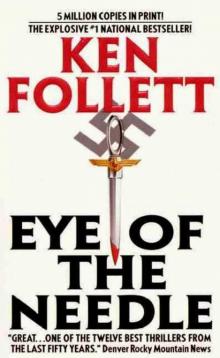 Eye Of The Needle
Eye Of The Needle Lie Down With Lions
Lie Down With Lions Winter of the World
Winter of the World Triple
Triple World Without End
World Without End Fall of Giants
Fall of Giants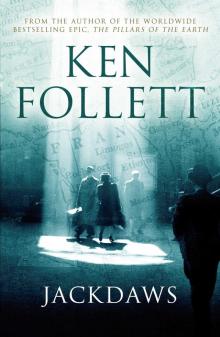 Jackdaws
Jackdaws Hornet Flight
Hornet Flight Whiteout
Whiteout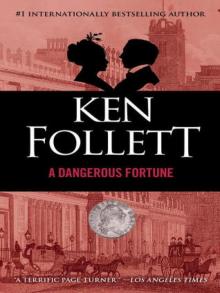 A Dangerous Fortune
A Dangerous Fortune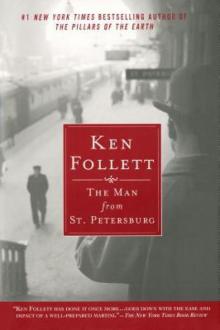 The Man From St. Petersburg
The Man From St. Petersburg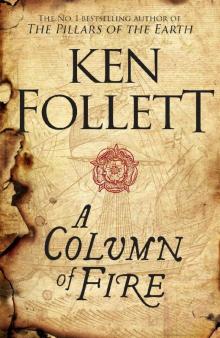 A Column of Fire
A Column of Fire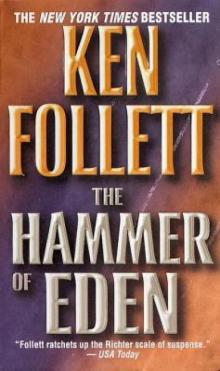 The Hammer of Eden
The Hammer of Eden On Wings of Eagles
On Wings of Eagles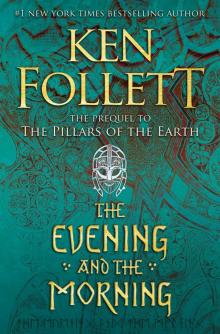 The Evening and the Morning
The Evening and the Morning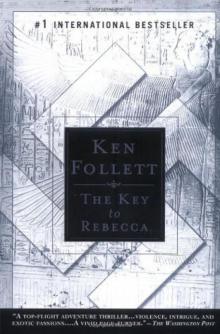 The Key to Rebecca
The Key to Rebecca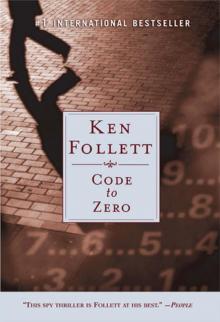 Code to Zero
Code to Zero Paper Money
Paper Money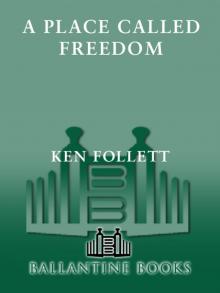 A Place Called Freedom
A Place Called Freedom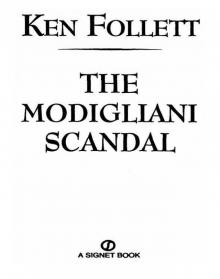 The Modigliani Scandal
The Modigliani Scandal Triple (1991)
Triple (1991)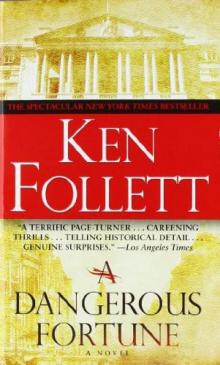 A Dangerous Fortune (1994)
A Dangerous Fortune (1994)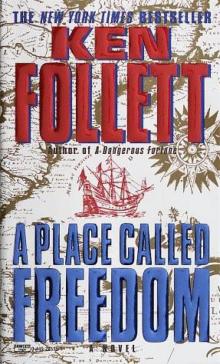 A Place Called Freedom (1995)
A Place Called Freedom (1995)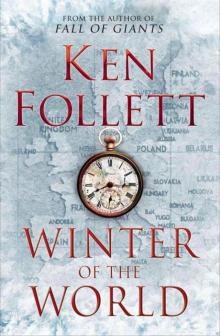 Winter of the World (Century Trilogy 2)
Winter of the World (Century Trilogy 2)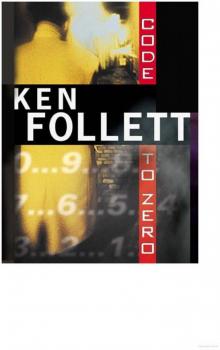 Code to Zero (2000)
Code to Zero (2000) On Wings Of Eagles (1990)
On Wings Of Eagles (1990) Storm Island
Storm Island Fall of Giants (The Century Trilogy)
Fall of Giants (The Century Trilogy)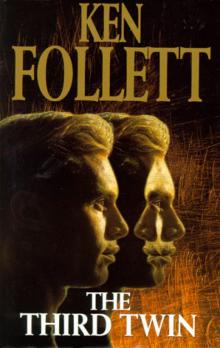 the Third Twin (1996)
the Third Twin (1996)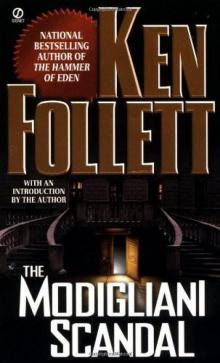 The Modigliani Scandal (1976)
The Modigliani Scandal (1976)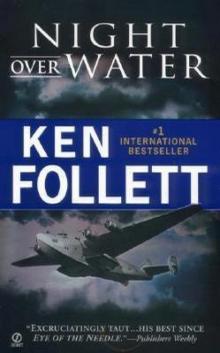 Night Over Water
Night Over Water